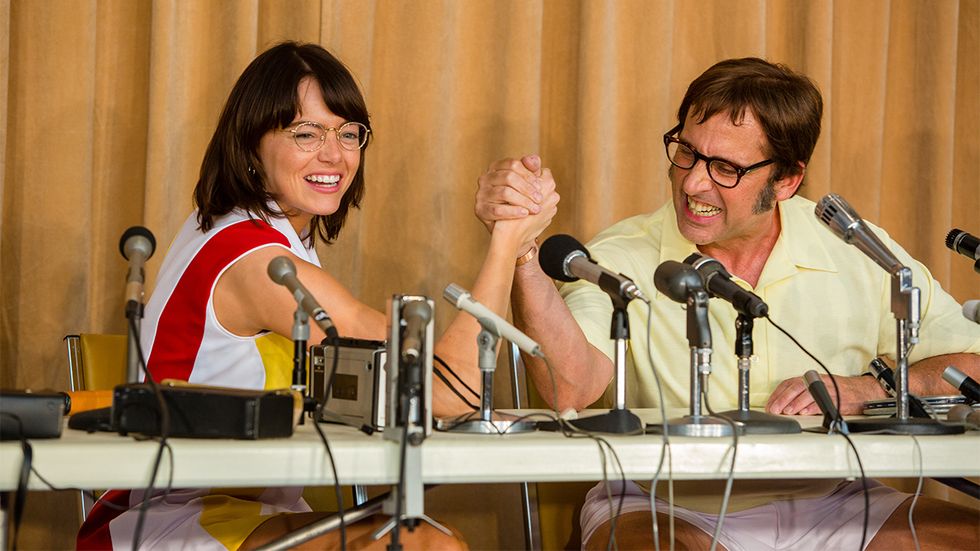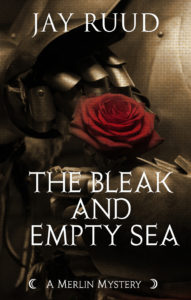Battle of the Sexes
Jonathan Dayton and Valerie Faris (2017)
[av_image src=’http://jayruud.com/wp-content/uploads/2014/08/Tennyson-180×180.jpg’ attachment=’77’ attachment_size=’square’ align=’left’ animation=’left-to-right’ link=” target=” styling=” caption=’yes’ font_size=” appearance=’on-hover’]
What I remember about the much-hyped tennis match between the remarkable Billie Jean King, then the top women’s player in the world, and the 55-year-old former men’s Wimbledon champ Bobby Riggs, was that we all thought it was a joke. Riggs had won Wimbledon in 1939—34 years before. How could that old man possibly think he could even stay on the court with the young, healthy and dominant King at the top of her game? I mean, sure, if King had been matched against, say, Jimmy Connors, then in his prime, it would have been a different story, with the man’s strength being perhaps insurmountable even if other skills were essentially equal. But Riggs? Come on.
But apparently I, and the people in my circle of friends and acquaintances at the time (basically graduate students in literature), were not exactly in the mainstream of public opinion (go figure). Even if the film was going to some lengths to underscore the secondary status of women’s tennis—and, by extension, women’s rights—at the time (1973), it was something of a rude shock to see the actual historical commentary by Howard Cosell at the match in the Astrodome, so condescending and misogynistic as it seems today, yet apparently absolutely typical at the time. So apparently, the vast majority of folks thought Riggs was going to dominate Billie Jean.
What I also believed at the time was that Riggs wasn’t at all serious about the outrageous things he said about women—how they belonged in the bedroom and the kitchen and nowhere else. He was essentially a clown, I figured, who was making himself into a caricature, even a parody, of the “male chauvinist pig” stereotype flourishing at the time. He was just trying to stir up interest in an event that ultimately drew 30,000 fans to the Astrodome, and reached a television audience of 90 million. And about that, if the accuracy of the film can be trusted, I was completely correct. What I wasn’t quite prepared for is how many people actually held such beliefs seriously. That was disheartening, but at least Riggs wasn’t running for president.
The directing team of Jonathan Dayton and Valerie Faris, who gave us the irresistibly upbeat Little Miss Sunshine, take on this material, which in the script by Oscar-winning screenwriter Simon Beaufoy (Slumdog Millionaire) is less about one specific sporting event as it is about a particular moment in history and the lives of two particularly colorful characters who came together at that moment and played an entertaining tennis match.
The film opens in 1972, just after King (Emma Stone, coming straight off her La La Land Oscar) has just won the U.S. Open and become the first woman in tennis to top $100,000 in income. Immediately we cut to a meeting between King and her manager Gladys Heldman (Sarah Silverman) and several male members of the tennis establishment, led by former pro Jack Kramer (Bill Pullman), in which King and Heldman are bringing up the huge discrepancy in pay between winners of men’s and women’s tournaments. “Men are more of a draw; the men are simply more exciting to watch,” Kramer mansplains. “Eight times more exciting?” King wants to know.
When the sport’s organizers refuse to address the issue, King withdraws from the establishment and founds her own women’s tennis circuit with eight other pros and with the sponsorship of Virginia Slims cigarettes (“You’ve Come a Long Way, Baby!”), obtained by Heldman, who keeps trying to get the women to light up occasionally on camera to keep the sponsor happy.
When former pro Bobby Riggs (Steve Carell) hears about the new women’s circuit intended to protest the small purses in women’s tennis, he makes a comment about players in tennis’s “senior circuit” being shortchanged as well, a bare hint of a motivation beneath the hustle, but that’s the last we hear of any such concerns. Riggs is presented as a hustler, a promoter, a lover of the spotlight stifled by a 9 to 5 office job in his father-in-law’s business, and a compulsive gambler. His frustration at being a “has been” when he was once one of the top players in the world meets his huckster’s recognition of a golden opportunity to cash in on Billie Jean’s defiance of the tennis establishment. But when he calls her with the idea of a “Battle of the Sexes” match, she dismisses the idea as the publicity stunt that it is, and turns him down.
Not to worry. Riggs has always got a backup. When Australian Margaret Court (Jessica McNamee), former women’s grand slam winner, wins the 1973 U.S Open, Riggs turns to her as likely substitute, and Court, lured by the $35,000 purse, agrees to meet him. To her it’s also a meaningless exhibition, and when Riggs defeats her handily she is disappointed but doesn’t seem to see it as a major setback for women in general. Unfortunately, the rest of the sports world, particularly the tennis media, begins to make noise as if Riggs was right: Any man can beat any woman at any time. And the implication is, at anything. There’s no way Billie Jean can let that go, and the match is on.
A large part of the movie is about the hype, and that’s mostly Riggs’ job. He clowns through all kinds of public appearances and doesn’t do much training, apparently overconfident after the ease of his victory over Court, and putting his faith in a regimen of vitamin supplements his trainer swears by. But in private, Riggs’ personal life is going through a very rocky period, as his long-suffering wife Priscilla (a welcome Elisabeth Shue) finally throws him out of the house when he continues to break his vows to stop gambling (he even has an ongoing card game with his therapist during sessions). At the same time, he is trying to restore a relationship with his estranged son, to whom he claims to have all kinds of plans, only to get the response, “I’ve heard them all before.”
But Billie Jean’s private life is going through its own twists and turns in the lead up to the much-hyped match. On the long tennis tour, King, who travels without her spouse, like the rest of the women (except Court), becomes romantically involved with her hairdresser Marilyn Barnett (Andrea Riseborough of Birdman). The two begin to room together on the road, and Billie Jean tries to keep the affair secret, not only because of her husband, but also because of what that kind of scandal might do to the budding women’s tennis renaissance she is spearheading. Court, who is aware of the relationship, is highly offended by it, but the tour’s gay clothing designer Ted Tinling (Alan Cumming) gives her support and a confidante. Ultimately, Billie Jean’s husband Larry (Austin Stowell of Bridge of Spies) becomes aware of the affair after all. His response is memorable for its humanity. No small roles.
By the time the match occurs, it is actually anti-climactic, since the movie has really been about human relationships, about justice and tolerance, about dealing with our personal demons and about how our partners live with those things. Or don’t. Carell has the flashier role here as the flamboyant Riggs, though his Riggs is mainly surface, with only very rare descents into the psyche. And perhaps that was the way Riggs himself was. Stone is far more understated as the introverted King, who has many balls in the air, only one of which is tennis. King’s two blocking figures, Jack Kramer (Pullman)—the personification of anti-feminist discrimination in tennis—and Margaret Court (McNamee)—the personification of society’s non-acceptance of same-sex couples—are presented pretty two-dimensionally. This is particularly unfair to Kramer, who was executive director and founder, in 1972, of the Association of Tennis Professionals. Kramer actually led a boycott of Wimbledon in 1973 when a Croatian player was denied the right to play in the tournament, so his history of advocacy for the underdog against the system is fairly strong. As for Court, she definitely is an opponent of LGBTQ rights, having just recently claimed that a Marriage Equality law, if passed, would destroy Christmas in Australia. So while her role in the film is two-dimensional, it is probably not inconsistent with the facts.
I did think that Cummings’ role might have been worth beefing up. As it is, it’s little more than a cameo. But his character, Ted Tinling, had started out as a tennis player himself, then became a fashion designer for women players, whose designs were so controversial that he was banned from Wimbledon for 33 years. The openly gay Tinling designed tennis wear for King, Martina Navratilova, Chris Evert, Evonne Goolagong and Virginia Wade, and was inducted into the International Tennis Hall of Fame in 1986. I wonder if Cummings’ role was bigger in the original script, but got edited in a move to cut back on the social commentary of the film. Which would be strange, since the film seems bent on making the tennis match a more significant event sociologically than it really was. I’d like to rate it higher, but this little bit of uncertainty about what the movie wants to be when it grows up makes me give it three Tennysons.
And by the way, if you like reading these reviews, you might be interested in Jay Ruud’s new “Merlin Mystery” novel, the third in the series, which will be released on November 10 and now available for pre-ordering on Amazon and on Barnes and Noble:
When word comes to Camelot that Sir Tristram has died in Brittany of wounds suffered in a skirmish, and that his longtime mistress, La Belle Isolde, Queen of Cornwall, has subsequently died herself of a broken heart, Queen Guinevere and her trusted lady Rosemounde immediately suspect that there is more to the story of the lovers’ deaths than they are being told. It is up to Merlin and his faithful assistant, Gildas of Cornwall, to find the truth behind the myths and half-truths surrounding these untimely deaths. By the time they are finally able to uncover the truth, Gildas and Merlin have lost one companion and are in danger of losing their own lives.
Purchase Tramadol Without Prescription Pre-order from Amazon here: https://www.amazon.com/Bleak-Empty-Sea-Tristram-Mystery/dp/1893035735/ref=sr_1_1?s=books&ie=UTF8&qid=1503328086&sr=1-1&keywords=Bleak+and+Empty+Sea
https://www.circologhislandi.net/en/conferenze/Buy Cheap Tramadol Overnight Pre-order from Barnes and Noble here: https://www.barnesandnoble.com/w/the-bleak-and-empty-sea-jay-ruud/1126958139?ean=9781893035737


